Charles Gravier, comte de Vergennes facts for kids
Quick facts for kids
The Count of Vergennes
|
|
|---|---|
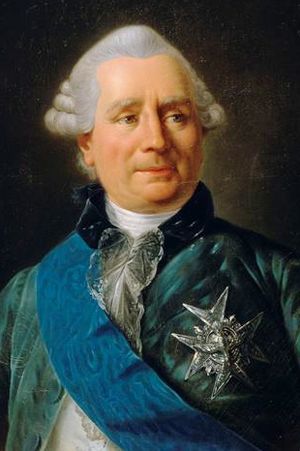
Charles de Vergennes, by Antoine-François Callet
|
|
| Chief Minister of the French Monarch | |
| In office 21 November 1781 – 13 February 1787 |
|
| Monarch | Louis XVI |
| Preceded by | Count of Maurepas |
| Succeeded by | Archbishop de Brienne |
| Minister of Foreign Affairs | |
| In office 21 July 1774 – 13 February 1787 |
|
| Monarch | Louis XVI |
| Preceded by | Henri Bertin |
| Succeeded by | Count of Montmorin |
| Ambassador of France to the Ottoman Empire | |
| In office 1755–1768 |
|
| Monarch | Louis XV |
| Preceded by | Pierre Puchot |
| Succeeded by | Count of Saint-Priest |
| Ambassador of France to the Kingdom of Sweden | |
| In office 1771–1774 |
|
| Monarch | Louis XV |
| Preceded by | François de Modène |
| Succeeded by | Pierre d'Usson de Bonnac |
| Personal details | |
| Born | 29 December 1719 Dijon, France |
| Died | 13 February 1787 (aged 67) Versailles, France |
| Political party | Non-partisan |
| Spouse |
Anne Duvivier
(m. 1730–1787) |
| Children | Constantin Louis |
| Profession | Diplomat, statesman |
Charles Gravier, also known as the Count of Vergennes (born December 29, 1719 – died February 13, 1787), was an important French statesman and diplomat. He served as France's Foreign Minister starting in 1774. This was during the rule of King Louis XVI. He is best known for his role in the American War of Independence.
Vergennes worked his way up in the diplomatic service. He had important jobs in Portugal and Germany. Later, he became the French representative to the Ottoman Empire in 1755. While there, he handled difficult talks during the "Diplomatic Revolution." He was called back to France in 1768. After helping a group that supported France gain power in Sweden, he returned home. Soon after, he became the Foreign Minister.
Vergennes believed that helping the American rebels would make Britain weaker. Britain had become very powerful after winning the Seven Years' War. His plan had mixed results. France helped America gain independence, but France itself did not get much from the war. The war was very expensive and hurt France's finances. This was a big problem leading up to the French Revolution. Vergennes remained a key figure in French politics during the 1780s.
Contents
Early Life and First Diplomatic Jobs
Charles Gravier was born in Dijon, France, on December 29, 1719. His family was part of the country's wealthy class. He grew up in Dijon and on his family's country lands. He had an older brother, Jean, who inherited the family estates. Charles's mother died when he was three years old. His father later remarried. Charles studied with Jesuits in Dijon. In 1739, at age twenty, he went to Lisbon, Portugal. He worked as an assistant to Théodore Chevignard de Chavigny, a distant relative and experienced diplomat. Chavigny was the ambassador to Portugal.
Working in Portugal and Bavaria
The main goal for Chavigny and Vergennes in Lisbon was to keep Portugal out of the War of the Austrian Succession. Portugal did not want to join the war, so this was an easy task. In 1743, Vergennes went with his relative to the court of Charles VII. Charles VII ruled Bavaria and was an ally of France against Austria. Their job was to keep him fighting, which they did successfully. They also helped create the Union of Frankfurt, an agreement among German rulers.
After Charles VII died in 1745, they tried to help his successor, Maximilian III. But they could not stop him from losing his capital, Munich. He made peace with Austria. In November 1745, Vergennes returned to France with his relative. The next year, they went back to Portugal. They stayed there until 1749, trying to make a trade agreement, but they were not successful.
The Congress of Hanover
After returning home, Vergennes was favored by the French Foreign Minister. In 1750, Vergennes became Ambassador to the Electorate of Trier. This was one of the smaller German states. A big challenge came when Britain tried to get an Austrian, Archduke Joseph, elected as the next Holy Roman Emperor. The French saw this as a British plan to gain more power in Germany. Vergennes's job was to stop this. He worked to get Trier's ruler to vote against Joseph.
In 1752, a special meeting called the Congress of Hanover was held to discuss the matter. Vergennes was sent there to protect French interests. He tried to delay or stop the election. France supported the Palatine state's demands for money from Austria and Britain. They insisted this be settled before the election. Britain agreed, but Austria refused. This caused problems between Britain and Austria. In the end, the British had to give up on the election.
This meeting was seen as a big win for Vergennes. He was praised for his skills. His time in Germany taught him a lot about diplomacy. He worried about Britain's decisions being influenced by public opinion. He also saw the growing power of Russia.
Ambassador to the Ottoman Empire
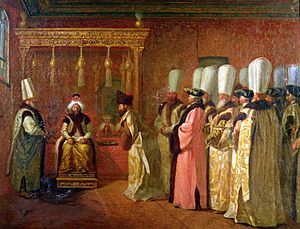
Vergennes's success in Germany led him to a new job in 1755. He was sent to the Ottoman Empire, first as a minister, then as a full ambassador. This was a very important position. Before he left France, he learned about the "Secret du Roi," which were secret plans of the king.
Vergennes arrived in Constantinople as the Seven Years' War was about to begin. Osman III had just become the Sultan. The Ottomans were old friends of France and important trading partners. But the Ottoman Empire was getting weaker, and Russia was growing stronger. Vergennes's job was to convince the Ottomans to challenge Russia, working with Prussia.
However, the "Diplomatic Revolution" of 1756 changed everything. France became friends with Austria and Russia, and an enemy of Prussia. This meant Vergennes had to change his message. The Ottoman leaders were angry about the new alliance between France and Austria. Vergennes spent years trying to fix relations. He tried to stop the Turks from attacking Austria or Russia.
Towards the end of the Seven Years' War, Vergennes faced new challenges. Russia's policies changed when Peter III became ruler, then changed again when his wife, Catherine the Great, took over. Vergennes also had to deal with a stolen Ottoman warship. Christian prisoners took it to Malta. The Sultan threatened to invade Malta, which could start a big war in the Mediterranean. France helped negotiate the return of the ship, but not the prisoners.
The Treaty of Paris in 1763 ended the war. France lost a lot of land to Britain. Vergennes was sad about France's reduced power. He was also worried about France's weakening influence in Poland. In 1764, Stanislas Poniatowski, a candidate supported by Russia, became king of Poland. Vergennes tried to get the Ottomans to step in, but France could not stop it. Stanislas was a friend of Catherine the Great, so many thought Poland would become a satellite of Russia.
Marriage and Return to France
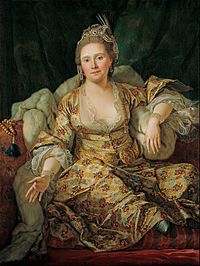
In 1768, Vergennes was called back to France. The official reason was that he married Anne Duvivier (1730–1798) without the King's permission. She was a widow from a respected family in Péra. The painter Antoine de Favray painted her in Turkish clothing before they married.
However, Vergennes was likely called back because Duc de Choiseul, another French minister, thought he was not doing enough to start a war between Imperial Russia and the Ottomans. Choiseul wanted to weaken Russia's power. Vergennes thought this was a bad idea, but he kept trying to convince the Ottomans that war was the only way to stop Russia.
Vergennes's marriage without the King's consent was a problem. He returned to France knowing he was in trouble. Despite his doubts, Vergennes did succeed in getting the Ottomans to declare war on Russia. The Russo-Turkish War started in 1768. Russia won, gaining new land and further weakening the Ottomans. Vergennes still took credit in France for starting the war. During this time, Vergennes and Choiseul developed a strong dislike for each other.
Mission to Sweden
After Choiseul was removed from power in 1770, Vergennes was sent to Sweden. His job was to help the "Hats" political group, who supported France, with advice and money. In 1772, King Gustav III took full power in Sweden. This was a big diplomatic success for France. It ended Sweden's "Age of Liberty."
Becoming Foreign Minister
When King Louis XVI became ruler in 1774, Vergennes was named Foreign Minister. His main idea was that the power of countries on the edges of Europe, like Great Britain and Russia, was growing too much. He believed this power needed to be reduced. When he got the job, he had spent almost 35 years working abroad. He admitted he had lost touch with what was happening in France. Some opponents made fun of him, calling him a "foreigner." But this also helped him see France's foreign affairs more clearly, considering the bigger picture in Europe.
The American War of Independence
Vergennes wanted to get back at Britain for France's losses in the Seven Years' War. This led him to support the Thirteen Colonies in the American War of Independence. Some historians believe that the money France spent on this war contributed to the French Revolution in 1789. As early as 1765, Vergennes thought that if France was no longer a threat in North America, the Americans would try to become independent. In 1775, fighting began, and in July 1776, the colonists declared independence.
France Enters the War
Even before France officially joined the war, Vergennes approved secret French help. Starting in early 1776, France secretly sent supplies, weapons, and volunteers to the American rebels. The British navy's blockade was weak, allowing many goods to reach America. In 1777, Vergennes told the American representatives that France recognized the United States. He said France was ready to form an alliance. After the Battle of Saratoga, a British defeat, Vergennes worried that Britain and the colonists might make peace. He quickly formed an alliance with the Americans. This alliance would almost certainly lead to war with Britain.
Vergennes had planned for France and Spain to enter the war together. But King Charles III of Spain wanted to try and settle the conflict peacefully. He did not want to encourage colonial revolts. Vergennes went ahead with the alliance with Benjamin Franklin, the American envoy. After France and America made their agreement, the Americans refused British peace offers.
War Strategy
American rebels were hopeful when France joined the war. However, the new French forces did not quickly change the war in North America. A French fleet under Admiral d'Estaing sailed to help the rebels. But they failed in attacks on British forces in Rhode Island and Savannah. This caused problems between France and America. Vergennes kept sending large amounts of money to support the war. But the British gained the upper hand with their "Southern Strategy."
In 1779, Spain joined the war against Britain. This made the combined French and Spanish fleet much larger than the British Royal Navy. But their attempt to invade Britain that year failed. This was a big setback for Vergennes. He had hoped for a quick and easy war against Britain. Now, it looked much harder and more expensive.
Neutrality and European Peace
Vergennes worked to get the northern European countries to form the First League of Armed Neutrality. This was achieved by Catherine II of Russia. Britain declared war against the Dutch Republic to stop them from joining the League. Vergennes thought the Dutch were more useful as neutral traders, supplying France through the British blockade, than as allies. He hoped the British war against the Dutch would make Russia join the war against Britain, but Catherine refused. The Dutch joining the war put more financial pressure on France.
Vergennes also helped settle the War of the Bavarian Succession between Austria and Prussia. He feared this conflict could start a major European war. He did not want French and Spanish troops to be pulled away from fighting Britain in America. The conflict ended peacefully with the Treaty of Teschen. France helped guarantee this treaty. Vergennes's plan to stop Britain from getting allies among the European great powers was successful. Unlike past wars, Britain had to fight the entire war without a major ally.
Victory at Yorktown
The first French forces under d'Estaing returned to France in 1779. The next year, another fleet was sent under Admiral de Grasse.
A large force of French soldiers, led by the comte de Rochambeau, arrived in America in July 1780. In October 1781, the French played a key role in the surrender of a British army at Yorktown. Even though Britain still had many soldiers and controlled several major cities, the British parliament decided in early 1782 to stop fighting the Americans. This decision did not apply to their other enemies in other parts of the world.
Challenges in 1782
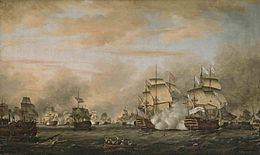
After the success at Yorktown, the French fleet went to the West Indies. Their plan was to invade Britain's colony of Jamaica. But in April 1782, at the Battle of the Saintes, the French fleet suffered a major defeat. Admiral de Grasse was captured by the British. Both France and Britain understood that this victory gave Britain control of the seas again.
Since 1779, French and Spanish forces had been trying to capture the British base at Gibraltar. In 1782, a big French-Spanish attack on Gibraltar failed. The fort was soon reinforced. This was a major problem for Vergennes. His alliance treaty with Spain meant France had to keep fighting until Spain controlled Gibraltar. Failing to take Gibraltar could make the war last much longer.
These two defeats made the French less confident after the Yorktown victory. Vergennes became more worried about the allies' chances in the coming year. By this time, peace talks were already happening. In 1782, Vergennes sent French troops to stop a democratic uprising in the Republic of Geneva. This uprising had started the year before.
The Treaty of Paris
By 1782, Vergennes was getting frustrated. He felt the United States was not using the large amounts of money France gave them very well. He told Lafayette, who had just returned from America, that he was "not marvelously pleased with the country." He found them "barely active and very demanding." Even though he had a good relationship with Benjamin Franklin, the American peace negotiators, John Jay and John Adams, did not trust Vergennes. They started separate peace talks with British representatives.
When Vergennes found out in November 1782 that the Americans had made a separate peace with the British, he felt betrayed. They had agreed to negotiate peace together. Britain gave the United States very generous terms, though they refused to give up Canada. Vergennes said, "The English buy peace rather than make it."
During the talks for the Treaty of Paris, Vergennes tried to balance the different goals of France, Spain, and the United States. He was not very sympathetic to the Dutch. He felt their poor effort in the war did not mean he should fight for their goals at the peace table. He played a big part in convincing Spain to accept a peace agreement that did not give them Gibraltar. Without Spain's agreement, the war would likely have lasted at least another year. France could not afford that financially.
France's own peace terms with Britain were finished in January 1783. Vergennes was eager to reach an agreement. He worried that another year of war would lead to more British victories. France received Tobago, some trading posts in Africa, and the end of trade limits at Dunkirk. Vergennes claimed that France's small gains showed that their involvement was disinterested. However, some criticized him, saying France bore most of the war's costs, while its allies got most of the benefits.
Last Years and Legacy
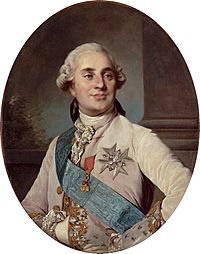
Even though France claimed victory in the American War of Independence, its foreign situation quickly worsened after 1783. France's money and resources were stretched thin. It could no longer play its usual strong role in Europe. During the Dutch Crisis of 1787, France could not stop Prussian troops from stepping in. They crushed the French-allied "Patriots" in the Dutch Republic. This diplomatic failure contributed to the French Revolution.
Vergennes encouraged King Louis XVI to support trips to Indochina. These trips helped France explore and later conquer parts of Indochina in the 1800s.
In French politics, Vergennes was a conservative. He worked to have Jacques Necker removed from his position. He saw Necker as a dangerous new thinker and a secret supporter of a republic. He also did not like Necker's pro-British views. In 1781, Vergennes became head of the finance council. In 1783, he supported Charles Alexandre de Calonne as the new Controller-General of finances.
Vergennes died just before a big meeting called the Assembly of Notables. He had suggested this meeting to Louis XVI. The meeting was delayed several times because Vergennes was sick from overwork. But on February 13, 1787, he passed away. When King Louis XVI heard the news, he cried. He called Vergennes "the only friend I could count on, the one minister who never deceived me."
After Vergennes's death in 1787, France's national situation got worse. This led to the start of the French Revolution in 1789. In January 1793, the rebels executed the King. France soon went to war with many of its neighbors. During the Reign of Terror that followed, many people who knew Vergennes were imprisoned and killed by the government.
Images for kids
See also
 In Spanish: Charles Gravier de Vergennes para niños
In Spanish: Charles Gravier de Vergennes para niños
 | James Van Der Zee |
 | Alma Thomas |
 | Ellis Wilson |
 | Margaret Taylor-Burroughs |


